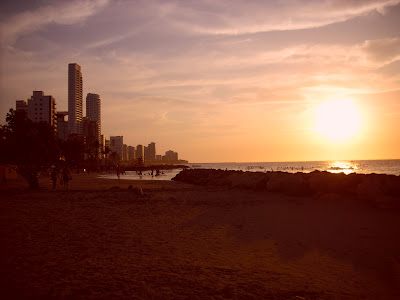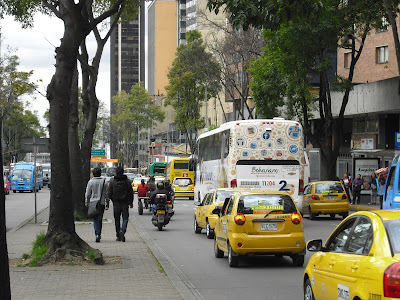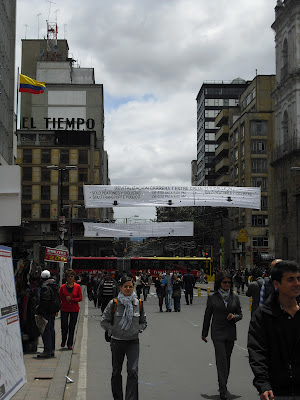One of the most popular questions we get thrown at us here by some of the locals when they realise we’ve been in the country for a bit is ‘¿Por qué Colombia?’, ‘Why Colombia?’
Many are quick to suggest an answer themselves with ‘a girlfriend’. But no, that’s not the reason for us.
In this land of ‘beautiful and plenty’ on the ladies' front – granted that many of them fall firmly into the crazy category even more so than the average woman (see ‘Colombia’s Locas’ http://bit.ly/XzHltA, amongst others) – we’ve yet to be overly enthused to commit to just one. A lot of that is really down to our honesty – and frugality – to be honest.
For if we were to play it the Colombian men’s way we’d commit to a number of women at the same time – indeed, most of the girls here expect as much (you could, in a sense, equate this kind of behaviour as taking the "best bits" out of the Muslim and Christian religions).
However, we’re just not in the commitment mood at this moment in time, full stop.
 |
| Bogotá has its charms. The weather, though, isn't usually one of them! |
So then, why indeed Colombia? Well, sticking with the reasons why we didn’t come here, making sack-loads of money is one of them. There are plenty of other countries across the globe we could hit for – we think, anyway – where we could make and save much more money doing more or less the same thing.
In terms of Bogotá specifically, our home for the best part of a year, we’re not here for the glorious weather and/or laid-back coastal lifestyle. The fact that we’re in a gas-guzzling construction-site of a city, with a population of about eight million, perched well inland at an altitude of over 2,600 metres accounts for that.
It would certainly be untrue to say, though, that we’re here against our will or wholly by accident.
It would certainly be untrue to say, though, that we’re here against our will or wholly by accident.
What is a fact, though, is what we’ve termed our second coming to South America, in June 2011, was aimed more at Chile than here.
That was because we wanted to give ourselves a more concrete reason to return to this continent than just willy-nilly travelling and we found the grounds for that in signing up as a volunteer for an English media group in Santiago.
Yet, tellingly enough, perhaps, we firstly spent two weeks in Bogotá and its surrounds before hitting overland for Chile. Now, that wasn’t just because it was far cheaper to fly here compared to Santiago – the chance to catch up with some friends from our first visit to Colombia (February 2009) was a much greater reason.
Cheap flights back to Ireland were, though, the biggest factor in our brief return to Colombia in October last year – a visit that was a more sobering experience of the country than previous ones, a few days in the company of a good friend in Cartagena excepted.
Cheap flights back to Ireland were, though, the biggest factor in our brief return to Colombia in October last year – a visit that was a more sobering experience of the country than previous ones, a few days in the company of a good friend in Cartagena excepted.
That ‘sobering experience’ was our first taste of how crazy Colombian women can turn for no apparent reason – what we thought was a good friend aggressively blanking us from her life.
However, after a necessary four-week stop in the home country, back we came, like suckers for punishment in a see-what-happens approach.
 |
| Landscape-wise, Colombia is up there with the best of them. |
An initial spell of wandering around to less-visited spots in this physically stunning country with its amazing and diverse wildlife helped us get over that aforementioned ‘defriending’ by someone who had been a strong initial reason in tempting us back in the first place (she is part of our life once more, however – we can be quite forgiving and lenient at times).
It was always likely that we’d return to Bogotá – Colombia’s ‘city of opportunity’, the best place for a local or expat to find work. It wasn’t that we were really stuck and needed money but we figured we’d give living here a go for a bit.
It was always likely that we’d return to Bogotá – Colombia’s ‘city of opportunity’, the best place for a local or expat to find work. It wasn’t that we were really stuck and needed money but we figured we’d give living here a go for a bit.
So after a slow, admittedly reluctant start, we did manage to find ourselves some steady, semi-profitable English teaching work (for more on this see ‘The Money Tongue’ http://bit.ly/V8ELH4). Not forgetting the odd bit of relatively enjoyable TV extras work – something different anyway (see ‘Giving just a little bit ‘Extra’’ http://bit.ly/NrbPc3) – a change being as good as a break.
After a while, though, like in any place, city living can become quite stale – even here in Bogotá. A lot of this is probably more to do with our own itchy-feet nature, especially when we have very few serious ties to a place and are relatively free.
After a while, though, like in any place, city living can become quite stale – even here in Bogotá. A lot of this is probably more to do with our own itchy-feet nature, especially when we have very few serious ties to a place and are relatively free.
The return of a very good local friend to this city after a 12-month absence coupled with our already existing good friends here is making it harder for us to take flight once more.
The Colombian authorities have also played their part – they make it pretty easy to stay on a mid- to long-term basis. If we had to put more effort and cost into staying here we might reconsider.
There is, of course, much more to Colombia than Bogotá and while we have seen a fair bit of the country there are still many other places worth discovering. With the seasonal slow-down in teaching work upcoming that may give us the opportunity to get moving.
After that, perhaps our subconscious reasons for staying will abate somewhat and we’ll have less of a reluctance to leave?
 |
| Is the sun setting on our time in Colombia? |
After that, perhaps our subconscious reasons for staying will abate somewhat and we’ll have less of a reluctance to leave?
One thing is for sure, at this remove anyway, the Colombian tourist board's slogan of ‘the only risk is wanting to stay’ – be that subconsciously or not – is certainly ringing true. We just don’t really know why that is.








